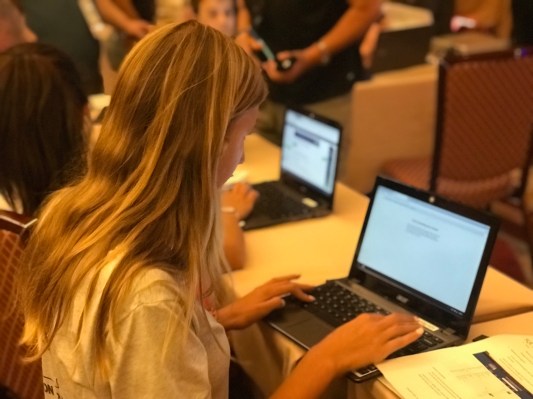It’s time to talk about election security.
Over the weekend at Def Con, the annual hacker convention in Las Vegas to discuss some of the latest and greatest (or scariest) trends in the wild world of hacking, a pair of election security hacking demonstrations set up for adults and kids alike offered up some frightening revelations about America’s voting infrastructure. (I’m not even going to begin to touch Voatz.)
For 11-year-old Emmett from Austin, hacking the website for the Florida Secretary of State was as easy as a simple SQL injection.
While it took Emmett only 10 minutes to break into the election reporting section of the Florida Secretary of State web page, it’s important to note that these pages were set up as replicas.
The idea, according to event organizers from Wickr (a secure communications platform), “was mainly focused on breaking into the portions of the websites that are critical to the election process, [so] the kids worked against the replicas of the webpages where election results are reported by secretaries of state.”
The replicas were built by the team at Wall of Sheep Village and they issued the following statement: “The main issues with the live sites we are creating the replicas of are related to poor coding practices. They have popped up across the industry and are not vendor specific.”
And while the National Association for the Secretaries of State had some choice words for the Voting Machine Hacking Village, they didn’t address the hacks the kids made on their actual web sites.
In all, some 47 kids participated in the election hacking contest and 89 percent of them managed to get in to the virtual websites set up by Wickr and Wall of Sheep Village.
Emmett, whose dad works in cybersecurity and who has been attending Def Con for four years, has some thoughts on how easy it was for him to get into the system and change the vote tallies for election results.
“It’s actually kind of scary,” the 11-year-old said. “People can easily hack in to websites like these and they can probably do way more harmful things to these types of websites.”
The point, according to Wickr’s (badass) founder Nico Sell, is to bring attention to just how flawed security operations remain at the state level in areas that are vital to the nation’s democracy.
“The really important reason why we’re doing this is because we’re not taking the problem serious enough how significantly someone can mess with our elections,” said Sell. “And by showing this with eight-year-old kids we can call attention to the problem in such a way that we can fix the system so our democracy isn’t ruined.”
Some executives at big corporations share the same concerns. For Hugh Thompson, the chief technology officer at Symantec, the risks are real — even if the problems won’t manifest in the most important elections.
As Thompson (who worked on election security in the early 2000s) told The Financial Times, “The risk that I think most of us worried about at that time is still the biggest one: someone goes into a state or a county that doesn’t really matter in the grand scheme of the election, is not going to change the balance on x, y or z, but then publishes details of the attack,” he said. “Undermining confidence in the vote is scary.”
Stakes are incredibly high, according to experts familiar with election security. Despite the indictments that Robert Mueller, the special counsel investigating Russian interference, issued against 12 Russian nationals for targeting the 2016 U.S. election, Russian hacking remains a threat in the current election cycle.
Microsoft has already said that it has detected evidence of attempted Russian interference into three campaigns already in the 2018 election cycle.
As Fortune reported in July, Microsoft’s vice president for customer security said that researchers at the company had discovered phishing campaigns that were linked to the GRU, the Russian military intelligence unit tied to the DNC election hacks from 2016.
For security officers working on the websites for the secretaries of state in the battleground states that the tween and teen hackers targeted during Def Con, young Emmett has some advice.
“Use more protection. Upgrade your security and obviously test your own websites against some of the common vulnerabilities,” the 11-year-old advised.
